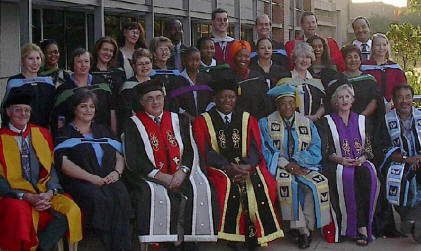Ga-Rankuwa – The unbundling of the University of Limpopo and the establishment of a new university incorporating the Medical University of Southern Africa (Medunsa) campus is on track.
Ministers for Higher Education and Training, Dr Blade Nzimande and Health Dr Aaron Motsoaledi announced this on Tuesday during a meeting with stakeholders at the Medunsa campus.
The two ministers spent the day at the campus holding meetings with members of the Council and Executive Management of the University of Limpopo, the Medunsa Campus Community, including campus management as well as labour unions and student structures.
The aim of the meeting was to brief them on developments regarding the process of separating the Medunsa campus from the competency of the University of Limpopo and the establishment of a new university incorporating the Medunsa Campus.
Joint Technical Task Team to assist
This follows consultations between Nzimande and Motsoaledi, who appointed a Joint Technical Task Team to review the merger that resulted in the University of Limpopo.
One of the highlights from the task team report was that the merger had been unsuccessful. According to the report, the capacity at Medunsa to produce key health professionals, especially from the black community, had been seriously compromised in the process.
Following this, the two ministers agreed to speed up the process and establish a new health sciences university.
Addressing the Medunsa community, Nzimande underscored the need for health professionals at all levels. He also stressed a need to develop skills in areas such as medical engineering, noting that the country still needed between 700 000 and 1.3 million community health workers between now and 2030.
“Given the shortage of almost all categories of health professional in the country, the new university must be comprehensive in terms of programmes that it offers. It must offer certificates, diplomas, primary degrees and also offer postgraduate degrees,” Nzimande said.
He added that the high-level task team would advise them on the process of unbundling the University of Limpopo. The team will also provide advice on proper governance and management processes and transitional arrangements, including setting up structures to ensure quality management and effective administration to guarantee the stability and sustainability of the institution.
Deadlines for new university
Nzimande said the new institution must be financially sustainable, and by the end of November this year, an interim council for the new university would have been appointed.
“At the beginning of January, a head of the campus would be appointed, who will work with the interim council towards the establishment of the full council and the appointment of a vice chancellor of the new university,” he said.
The intention, Nzimande said, was to start the new university by the beginning of the 2015 academic year and for first intake to happen in that year.
He urged the campus community to work together with government to ensure that the project is successfully completed. He also asked the community to discuss and debate on a new name for the university.
New medical university after 28 years
Minister Motsoaledi expressed his appreciation for the latest development, citing the country’s dire need for comprehensive health and health programmes institutions of this nature.
“No new medical university has been established in this country for the past 28 years. The new university has to accommodate the growing needs of our democratic society and incorporate a broad range of health related disciplines as well as trans-disciplinary programmes,” Motsoaledi said.
Speaking on behalf of the Chairperson of the Council of the University of Limpopo, Deputy Chairperson Benny Boshielo said the council was grateful for the consultation and the day’s meetings were constructive and many issues were clarified.
“We are ready to proceed on this journey together and offer our full support to ensure the desires of government are fully compliant. It is our desire to take leadership from government for effective management and governance of the institution, including the academic direction which our institution should take.
“We are fully alive to the human capital challenges, especially in the health sector, the country faces, which our institutions should mitigate. Speed is of essence in bringing this process to a conclusion. It is our commitment to ensure that this process proceeds orderly and within the framework of the law, and produce the required results in a most responsible way,” Boshielo said. – SAnews.gov.za




